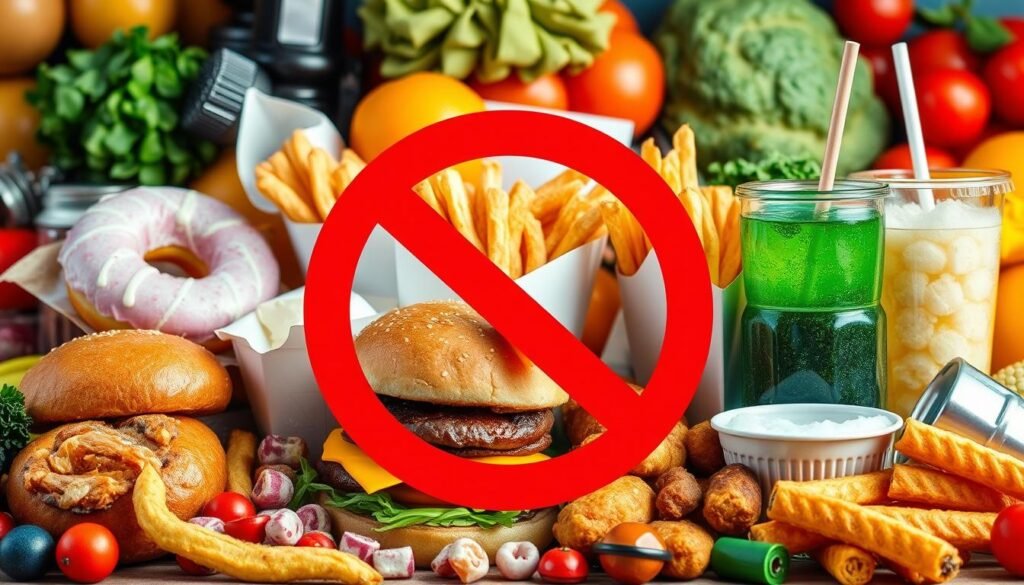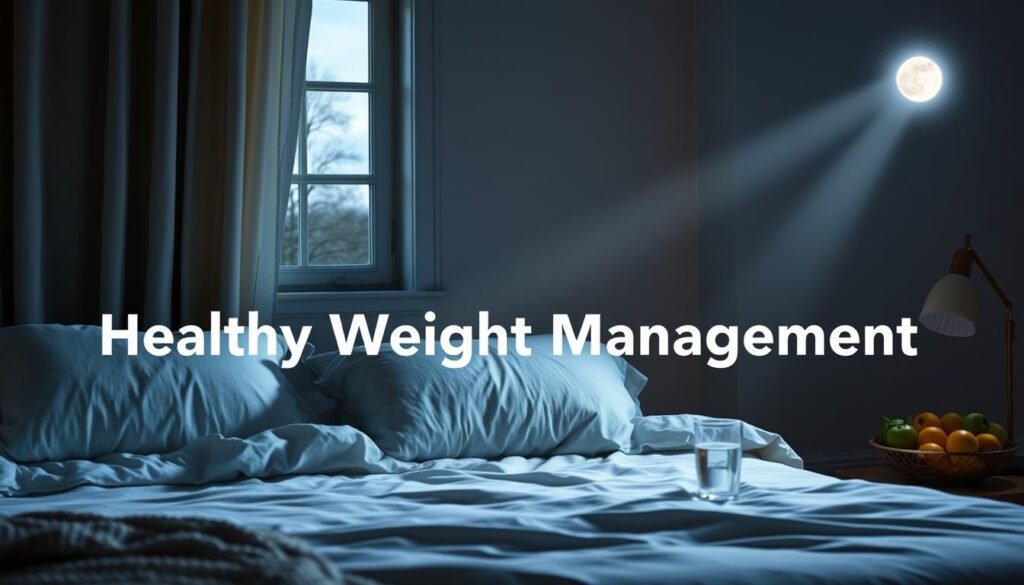Did you know that about 60% of what affects our health comes from how we live? The World Health Organization says lifestyle choices have a big impact. This includes what we eat and how active we are. Making good decisions in these areas is key for a healthy life at any age.
We’re going to look at how eating right, staying active, drinking water, getting enough sleep, and handling stress all work together. Each part is important for staying physically and emotionally strong. By making smart choices in these areas, we can live better, avoid long-term health problems, and feel more energetic. Let’s dive into how to live a healthier life with some useful tips.
Key Takeaways
- Approximately 60% of health outcomes are influenced by lifestyle choices.
- Healthy eating can lead to increased energy and improved health.
- Regular physical activity is linked to lower risks of chronic diseases.
- Roadblocks like time constraints and lack of support can hinder lifestyle changes.
- Tracking progress and rewarding oneself aids in maintaining healthy habits.
- Education and active lifestyle choices reduce the risk of cognitive decline.
The Importance of a Healthy Diet
Eating well is key to good health. It’s about getting the right mix of nutrients: carbs, proteins, fats, vitamins, and minerals. These nutrients give us energy and help our bodies work well. Eating right is crucial for keeping us healthy long term and fighting off diseases.
Understanding Balanced Nutrients
Getting the right nutrients is all about balance. Mixing different foods gives us the essentials we need. Foods high in fiber, for example, help lower cholesterol and keep our hearts healthy. Eating less saturated fats, found in foods like fatty meats and whole milk, is also important. Choosing water over sweet drinks is another healthy choice.
Impact on Long-Term Health
A balanced diet helps us avoid chronic diseases. It’s important for managing weight, reducing cancer risk, and improving the health of those who are obese. Diets full of fruits, veggies, and whole grains, like the Mediterranean diet, are also good for our mental health. Eating plenty of fruits and veggies can protect us from many diseases.
B vitamins and iron are key for our brains, helping to keep our minds sharp. For people with diabetes, cutting down on added sugars and fats is crucial. Overall, a healthy diet supports our physical and mental well-being. It helps us live a longer, happier life. For tips on eating well, check out the World Health Organization.
Key Nutrition Elements for a Healthy Diet
Starting a healthy diet means knowing the essential nutrition elements. It’s important to eat different types of foods. This enhances nutritional intake and health. Key elements like vegetables, fruits, whole grains, and lean proteins are vital. They help us have a balanced diet and lead to better health.
Vegetables and Fruits
Vegetables and fruits are crucial for a healthy diet. They’re packed with vitamins, minerals, and fiber. These nutrients are essential for our bodies. Eating at least 400 grams, or five portions a day, lowers disease risk. Include foods like leafy greens, carrots, berries, and citrus fruits. A variety of colors means a mix of nutrients, which is good for wellness.
Whole Grains
Whole grains are key for health. Examples include brown rice, quinoa, and whole wheat pasta. They offer B vitamins and fiber, helping with digestion and weight. The Dietary Guidelines for Americans recommend that carbs be 45% to 65% of our daily calories. They stress choosing whole grains over refined ones.
Lean Proteins
Lean proteins are needed for repairing tissues and keeping muscles healthy. Good sources are fish, poultry, legumes, and nuts. Proteins should make up 10% to 30% of our daily calories, depending on our lifestyle. Having different protein sources helps muscles and body functions. Choosing lean options aids in keeping a balanced diet and prevents chronic diseases.
Exercise Routine and Its Benefits
Having a regular exercise routine is key for your mind and body health. Physical activities like jogging, lifting weights, or even walking can greatly enhance your well-being. By mixing different exercises, you can enjoy many health rewards.
Types of Physical Activity
Different exercises offer special benefits for your health:
- Aerobic exercise: Running, biking, and swimming boost your heart health.
- Strength training: Lifting weights or using resistance bands makes your muscles and bones stronger. It also helps keep a healthy body weight.
- Flexibility and balance exercises: Yoga and tai chi can make you more flexible and prevent falls.
The U.S. Department of Health and Human Services suggests that adults should get at least 150 minutes of medium-paced aerobic activity every week. Or 75 minutes of high-paced activity. For more health gains, 300 minutes of medium activity is better.
How Exercise Improves Mental Health
Exercise is great for your mind, not just your body. It can:
- Lessen feelings of anxiety and sadness.
- Brighten your mood by releasing chemicals in your brain that make you feel relaxed and happy.
- Boost how well you sleep, giving you more energy.
Doing fun and social activities can also help you connect with others. This can make you feel more relaxed and less stressed. An active lifestyle might also make you better able to handle life’s challenges. For more on exercise’s benefits, check out this detailed guide.
Diet and Lifestyle Factors to Avoid
Knowing which diet factors to avoid is key for better health. It’s important to cut back on ultra-processed foods and sugary drinks. Learning about their harmful effects helps people choose wisely.
Ultra-Processed Foods
Ultra-processed foods are packed with added sugars, unhealthy fats, and a lot of sodium. They’re not good for you, offering little nutrition but leading to weight gain and diseases. Studies show eating too much of these foods increases heart disease, stroke, and diabetes risks. It’s best to eat whole, minimally processed foods instead.
Sugary Beverages
Sugary drinks like soda, energy drinks, and sweet tea are full of empty calories. The sugar in these can cause you to eat too many calories. This leads to weight gain and health problems. Cutting down on these drinks can help avoid diseases related to bad lifestyle choices.

| Type | Risks | Health Impact |
|---|---|---|
| Ultra-Processed Foods | Weight gain, chronic disease | Increased risk of heart disease, stroke, type 2 diabetes |
| Sugary Beverages | Empty calories, excessive sugar intake | Weight gain, higher risk of diabetes |
Avoiding bad diet factors and choosing healthy lifestyles boosts health. Choosing whole foods over processed ones helps you stay well.
The Role of Hydration in Health
Hydration is key to staying healthy. Knowing its benefits shows how crucial drinking enough water is. It affects how we function, our physical health, and our mood. Without enough water, we might feel tired, less focused, and low on energy. It’s important to know how much water we need to keep our health up.
Benefits of Drinking Water
Water helps our body in many ways. It helps with digesting food, keeping a normal temperature, and moving nutrients around. Drinking more water leads to eating healthier. For those who exercise or play sports, staying hydrated is even more critical. They might need special drinks to replace lost fluids and salts. Foods like watermelon and cucumbers also help us stay hydrated because they’re mostly water.
How Hydration Affects Energy Levels
Drinking enough water keeps our energy up. Adults in the U.S. should drink about 1.5 to 2 liters, or 8-10 cups, of fluid each day. Kids need about 6-8 drinks daily. Not drinking enough can make us feel tired and perform worse physically and mentally. Choosing water over sugary drinks helps keep our energy stable. Keeping track of how much water we drink can make us better at sports and improve our daily life.
| Water Intake Recommendations | Adults | Children |
|---|---|---|
| Daily Fluid Intake | 1.5-2 liters (8-10 cups) | 6-8 cups |
| Fluid Contribution from Food | About 22% | Similar to adults post-teenage years |
| Impact of Dehydration | Decreased energy levels | Fatigue in physical activity |
Understanding how crucial hydration is matters a lot. We need to make drinking water a priority. This helps us stay full of energy and healthy every day.
Sleep and Its Connection to Lifestyle
Quality sleep is vital for our health and wellness. It’s important because it affects weight control and overall health. Getting to know how sleep and life choices connect can help us feel better.
Optimal Sleep Duration and Quality
Adults need seven to eight hours of good sleep each night. Sleeping less than seven hours can bring health issues like obesity and diabetes. Those who don’t sleep enough may not eat a variety of foods. They often miss out on important nutrients such as protein and fiber. This can make staying at a healthy weight harder.
Sleep’s Impact on Weight Management
Sleep affects weight control a lot. Not sleeping enough can lead to eating too much or craving unhealthy food, which leads to weight gain. It can also mess up the hormones that control hunger. This makes it hard for people to keep eating healthy. Yet, eating lots of vegetables and lean proteins can help you sleep better. This good sleep then supports better food choices. Below is a table that shows how sleep and eating habits are linked:
| Sleep Duration | Dietary Quality | Energy Intake |
|---|---|---|
| Short ( | Lower adherence to healthy diets | Higher intake, mostly from fats and snacks |
| Normal (7-8 h/night) | Higher adherence to healthy diets | Balanced energy intake |
| Long (≥9 h/night) | Mixed adherence | Potentially higher calorie intake |
Making quality sleep a priority is key for good weight control and health. Good sleep habits are the base for making healthier choices in life.

Stress Management Techniques
Managing stress well is key to a healthy life. By using different strategies, people can lower anxiety and build emotional strength. This includes mindfulness and regular workouts, which greatly help mental health.
Mindfulness Practices
Mindfulness means living in the moment fully. Methods like meditation and yoga are really helpful for stress. They help improve emotional health, making tough times easier to deal with. Trying simple breath exercises or guided imagery can also bring peace. Doing these regularly helps form a helpful habit that calms and lessens worry.
Exercise as a Stress Reliever
Adding workouts to your day is great for beating stress. Actions like running, biking, or any exercise boost endorphins, improving your mood. The Canadian Journal of Psychiatry says regular activity helps brighten moods and ease stress. It suggests exercising for 30 minutes on most days. You can start with light activities or do what you enjoy, then slowly increase the effort.
Mixing mindfulness with working out boosts both mind and body health. These approaches are key for managing stress well and living healthier. For more about exercise benefits, check this resource.
Alcohol Consumption and Lifestyle Choices
Understanding the role of alcohol in lifestyle choices is key to good health. Many people like to drink in moderation during social events. But too much alcohol can cause serious health issues.
Moderation and Its Benefits
Drinking moderately has its perks. Men should stick to one or two drinks a day, while women should have no more than one. Drinking like this may help lower heart disease risk due to useful substances in some drinks. Yet, it’s important to be cautious as evidence is not strong enough for all.
Understanding Alcohol’s Impact on Health
Drinking too much brings many health risks, such as high blood pressure, stroke, and cancer. It can increase the chance of liver disease and depression. Binge drinking is especially harmful.
Alcohol also affects metabolism. It can cause high triglyceride levels and heart rhythm problems. It messes with blood sugar, making diabetes harder to manage. Pregnant and breastfeeding women should avoid alcohol completely to protect their babies.
Thinking about alcohol in meal planning can help manage calories, as drinks vary from 100 to 500 calories. Finding healthier ways to deal with stress, like exercising or relaxing, is better than drinking.
| Type of Alcohol Intake | Recommended Limit (Daily) | Possible Health Benefits | Health Risks |
|---|---|---|---|
| Moderate Drinker | Men: 1-2 drinks, Women: 1 drink | Potential heart health benefits | Low to moderate risks |
| Binge Drinker | Men: 5+ drinks in 2 hours, Women: 4+ drinks | None | High risk for stroke, liver disease, and other conditions |
| Heavy Drinker | 14+ drinks per week | None | Severe health impacts including depression and risk of accidents |
Smoking and Its Detrimental Effects
Smoking is very bad for your health. It puts you at a higher risk of many diseases. These include lung cancer, heart disease, and COPD. Secondhand smoke also harms those around you. It can give non-smokers the same diseases. Smoking can lead to autoimmune diseases, fertility problems, and make you age faster.
Health Risks Associated with Smoking
Smoking can cause different kinds of cancer. It’s linked to cancer in the lungs, throat, mouth, stomach, and bladder. If you stop smoking, you’ll start to see health benefits. Your lungs and airways can begin to heal. Recovery depends on how much you smoked before. But some conditions like COPD can’t be reversed. A healthier lifestyle helps those trying to quit.
There are good ways to stop smoking. You can change your lifestyle, try nicotine replacements, or get help from a doctor. Eating right and drinking water helps. Exercise is good too, it makes you feel better and helps fight cravings. It’s also important to talk to a doctor about lung cancer screenings.
To learn how smoking and what you eat are connected, click here. Making smart choices about how you live can help smokers and non-smokers be healthier.
Work-Life Balance and Mental Well-being
Finding the right work-life balance is key to your mental health. It’s tough balancing job duties and personal activities. But, with good lifestyle habits, you can achieve this balance. This leads to better health and happiness.
Strategies for Achieving Balance
To manage work and life better, try these tips:
- Setting boundaries: Make clear limits between work time and personal time.
- Prioritizing self-care: Do things that make you happy, like hobbies or exercise.
- Scheduling regular breaks: Breaks during work keep you focused and reduce burnout.
Combating workplace stress is crucial, as many workers feel worn out. Adding mindfulness to your day helps your mental health.
Creating a work-life balance is everyone’s job, including employers. When companies support good lifestyle habits, everyone benefits. This leads to more productivity and less stress.

Conclusion
Making a commitment to a healthy lifestyle is key to improving your overall health and life quality. This article looked at many diet factors. It stressed the importance of a balanced approach that includes good nutrition, exercise, staying hydrated, and getting enough sleep. All these elements work together to boost your health, and learning how to manage stress helps too.
The clear evidence suggests that adopting healthier habits greatly reduces the risk of diseases like heart disease, stroke, and obesity. A holistic approach—addressing all aspects of lifestyle together—offers the best outcomes. Avoiding bad habits such as smoking and eating too much junk food can really boost your health.
In conclusion, this look at diet and lifestyle choices highlights a simple truth: making real changes can bring lasting health benefits. More and more, people understand how their choices affect their health. They are moving towards a life that focuses on preventing illness and promoting a healthier future.